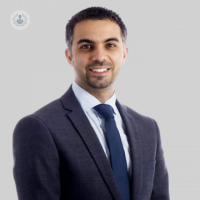What to know about prostate cancer
Written in association with:Prostate cancer is one of the most common cancers in men, and the chances of contracting it increase as men age. In this article, consultant urologist Dr Ahmed Ali explains the signs of prostate cancer and treatment options.

The prostate is a small gland in the pelvis that produces the fluid which carries the sperm from the testicles during ejaculation.
Prostate cancer is typically diagnosed in men over the age of 65, but the risk increases after the age of 50. It rarely occurs in younger men, but it is possible that a lack of testing and awareness can contribute to underdiagnosis. As it advances in stages, the cancer can begin to spread to other organs and tissues.
What are the signs of prostate cancer?
Prostate cancer tends to develop very slowly and may be asymptomatic over many years. In the course of prostate cancer, the prostate enlarges and eventually can become big enough to obstruct the urinary tract, leading to symptoms such as:
- Increased frequency of urination
- Difficulty starting urination
- Painful urination
- Painful ejaculation, or inability to ejaculate
- Blood in the urine (haematuria)
How is prostate cancer diagnosed?
Often, men who begin to struggle with these symptoms and seek diagnosis will often undergo a blood test as one of the preliminary tests, which will reveal elevated levels of prostate-specific antigen (PSA).
However, an enlarged prostate and the accompanying symptoms are not necessarily indicative of prostate cancer – an enlarged prostate commonly occurs in ageing men due to a hormone called dihydrotestosterone which triggers growth. When the prostate enlarges or becomes inflamed, it begins to produce PSA.
High levels of PSA can be due to benign prostate enlargement (BPE), prostatitis, a urinary tract infection (UTI), ageing, medications like testosterone-replacement therapy, or even just vigorous exercise.
To confirm the diagnosis, further tests such as digital rectal exams (DRE), MRIs, and prostate biopsies may be performed.
How is prostate cancer treated?
The prognosis for prostate cancer varies widely depending on the stage at diagnosis and the cancer’s aggressiveness. Localised prostate cancer, which has not spread beyond the prostate, has a very high survival rate. Nearly all men diagnosed with early-stage prostate cancer survive for at least five years, with many living for much longer. However, if the cancer has spread to other parts of the body, the prognosis becomes more challenging.
Management and treatment of prostate cancer depend on the stage and grade of the cancer, as well as the patient’s overall health. Options include:
- Active surveillance for low-risk cases
- Surgical removal of the prostate (prostatectomy)
- Radiation therapy
- Chemotherapy
- High-intensity focal ultrasound (HIFU), which utilizes heat to kill the cancer cells without affecting normal cells and has less side effect than radical treatments
- Cryotherapy, which is performed by liquid nitrogen being injected into the prostate to destroy the cancer cells
In recent years, newer treatments like immunotherapy and targeted therapies have also emerged, offering hope for better outcomes with fewer side effects. Understanding these aspects of prostate cancer can help guide discussions with healthcare providers and inform decisions about screening and treatment. It is highly recommended that men undergo regular screening in order to catch prostate cancer in its earliest stages.
If you have concerns regarding your prostate, consult with Dr Ali via his Top Doctors profile.


